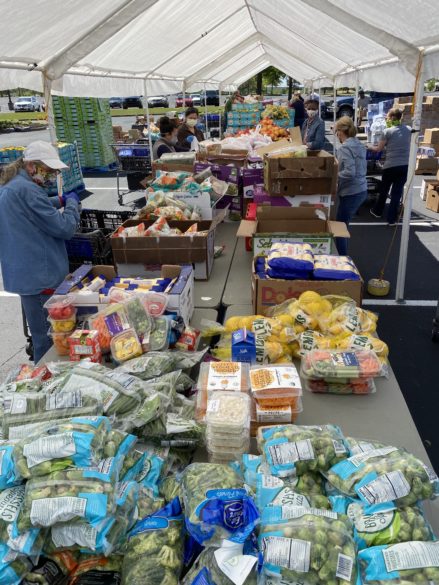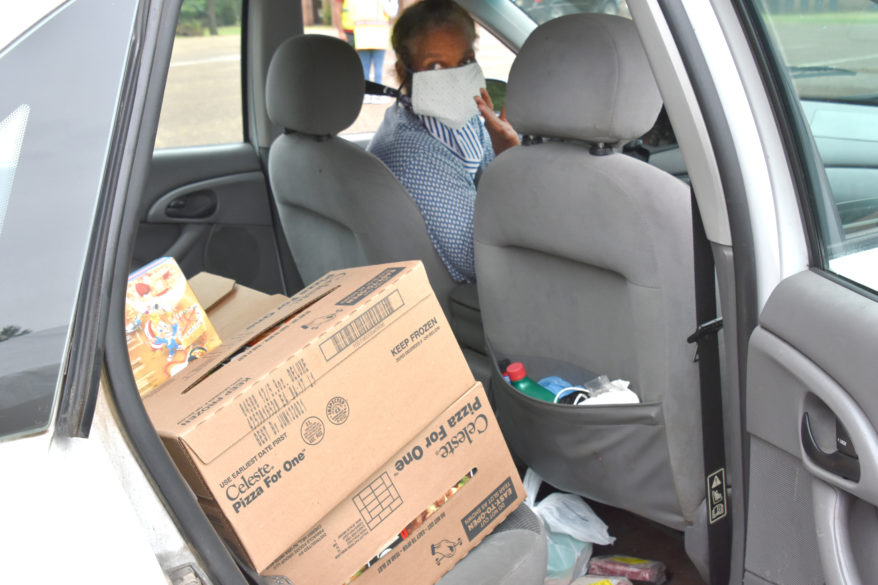By Laura Grisham
SENATOBIA – A steady stream of cars maneuvered through the parking lot at St. Gregory The Great Catholic Church last Thursday. The mobile pantry in Senatobia had been open for just over an hour. Volunteers and staff, with machinelike movement, gathered boxes and bags of produce, cereals, meats and other staples and placed them in the vehicles as they rolled through.
Even before the coronavirus pandemic wreaked havoc on the nation’s food supply and economy, nearly one in every five Mississippians had trouble getting enough food due to lack of income or other issues. Disruptions to food-supply chains, employment and other services because of COVID-19 worsened the situation.

For more than six years, Sacred Heart Southern Missions (SHSM) has sponsored the DeSoto and Marshall County mobile pantries, providing fresh, nutritious food to struggling families and individuals each month. The mobile pantry program brings regular food distributions to the hard-to-reach places that need it the most. A tractor-trailer full of fresh fruits, vegetables, shelf staples and meats are distributed at each of our mobile sites.
Given the toll the public health crisis has taken on communities across the area served, SHSM has intensified its efforts to safeguard the health and wellbeing of poor families, especially older adults and children, who lack sustained access to healthy food and adequate nutrition.
Since the onset of the pandemic in mid-March, SHSM has hosted 22 mobile food pantries across the five counties of their service area. That’s an additional ten distributions on top of their regularly scheduled mobiles. In six months, more than 430,000 pounds of food has been given out to hungry families at these distributions — more pounds than all of last year’s mobile pantries combined.
Tragically, the disabled and elderly are some of the most vulnerable that SHSM serve. Nearly one third of those who come to SHSM social service offices for assistance are the elderly poor. Attempting to balance basic living expenses on fixed incomes, they are presented with an impossible choice — to pay for utilities, life-saving medicine or a meal on the table. And now, with the COVID-19 pandemic, they are more vulnerable and isolated than ever before.
“These days, at a trip to the grocery store, I only get about half of what I used to,” said Lee, as he waited in line. “I am on a fixed income. The price of everything has gone up, but what we old folks get has not. I can’t hardly afford to eat.”

Lee says the mobile pantries provide him with the extra groceries he needs to make it through the month. For his sister, Carol, who was in the car behind him, SHSM’s distributions are even more critical. Carol has cancer.
“My twin sister, Carol, back there,” Lee motioned to the car behind his, “she is terminal. She can’t afford nothing with buying medicine and all. I told her about this food and it is helping her and her family out a whole lot.”
For seniors and other adults who are at high risk for COVID-19, the mobile pantry program is a blessing in several ways. Besides providing them with fresh, healthy food and supplementing their meager incomes, the drive-through distribution arrangement allows them to avoid crowded retail stores, thus reducing the possible exposure to the virus.
Mattie, another elderly woman in line commented, “This food sure helps me be able to pay my bills.” A friend had told Mattie about the mobile opportunity in Senatobia last month. Eagerly, she inquired when Sacred Heart would be returning for another distribution. “I was so glad that I could get it so close to home. Thank ya’ll so much!”
Food pantry manager Jose Franco said that grateful comments like these are a common occurrence at the mobiles. “You hear them all the time! There are so many people in need, and they are thankful for the help.”
Hunger is a problem that most often affects low-income families. Many hardworking families and individuals are living paycheck to paycheck, then suddenly, an illness or other disaster strikes and they can no longer afford food. Others juggle their bills every month, knowing there will never be enough money.
Jose recalled last month’s mobile food distribution in Senatobia. As he assisted a woman with her intake form, he noticed three young children in the back seat of her car. The woman explained that she and her husband had both recently lost their jobs and they had no food to give their family. Pointing to the form, she said, “We don’t have any income … is that ok?”
“That was heart-breaking,” Jose said quietly.
Unfortunately, this woman’s plight is something SHSM sees often. Yet, no matter how many times they meet people struggling in life and hear their stories, the impact on them never lessens.
SHSM continues to prioritize food distributions in their communities in Northwest Mississippi.
Through the generosity of our donors and the continued support of volunteers, SHSM is able to ensure that people like Lee, Carol, Mattie and countless others facing unimaginable financial challenges have access to nutritious food. Looking ahead, additional pop-up mobile pantries have been added to SHSM’s regular monthly schedule to help even more people in need, providing them an essential lifeline during these difficult times.
